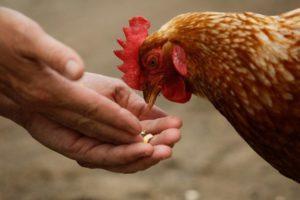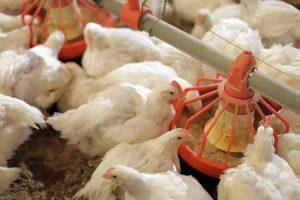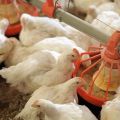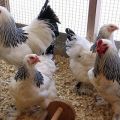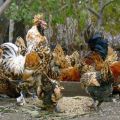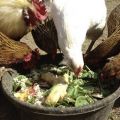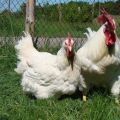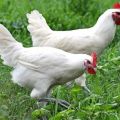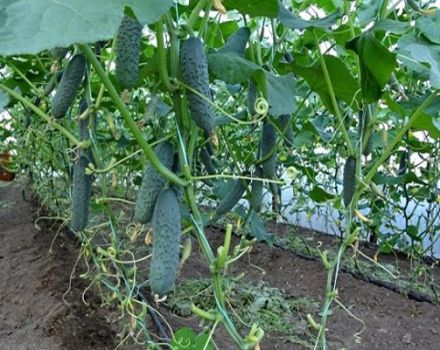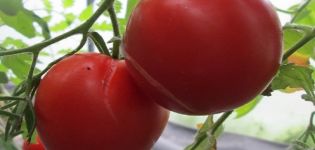The better to feed chickens at home so that they carry a lot
Novice farmers often wonder what is the best way to feed chickens. In order for birds to grow and develop normally, they need a specific menu. It should include the optimal amount of protein, fat and carbohydrates. An adequate supply of vitamins and minerals is essential. Thanks to a balanced diet, it is possible to achieve high productivity and avoid the development of various pathologies.
Basic rules for feeding chickens
Laying hens are considered to be very picky birds. They can feed on weeds, grains, food waste. However, with such a diet, you will not be able to achieve good productivity. If the chickens do not receive enough nutrients, they will start to get sick.
For the birds to feel good, they should be fed with grain or compound feed. Cereals should make up 60% of the total food. The menu should contain plant and animal products that provide a sufficient amount of proteins, fats and carbohydrates. If necessary, it is worth introducing vitamin and mineral products.
When choosing cereals, the following products should be preferred:
- Wheat - contains vitamins B and E. The product contains vegetable proteins.
- Wheat bran - their nutritional value is higher than that of whole grains.
- Corn - contains a lot of carbohydrates. It is recommended to give this product to chickens in a chopped form.
- Oats - this product is recommended to be crushed and steamed. If you feed the birds with unpeeled oats, there is a risk of irritation of the esophagus and intestines.
- Oat bran - Can be a great alternative to grains.
- Barley - Benefits beef birds. It is also permissible to give it to chickens in the meat and egg direction.
- Rye and millet.
- Buckwheat - makes up a maximum of 10% of the diet.
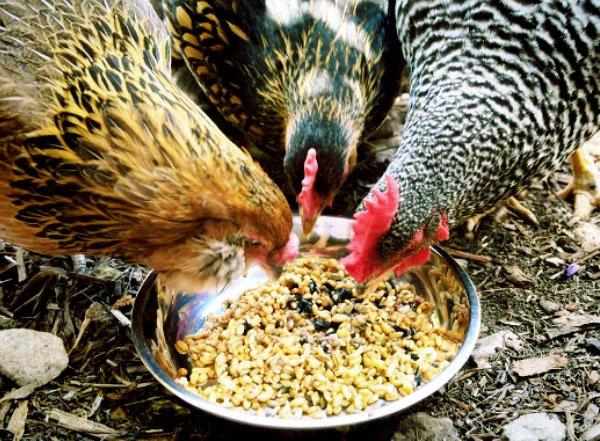
Even mixtures of grains that are optimal in composition contain little calcium, protein substances, phosphorus and other important elements, therefore these components are certainly introduced into the diet.
Use the following as beneficial supplements:
- legumes;
- sunflower seeds;
- flaxseed flax;
- cakes and meal, which include a lot of protein ingredients and fiber.
Birds should definitely be given minerals. These include fine gravel and ash. Also, useful substances contain shells and salt.
Types of feed
There are a number of types of feed for chickens, allowing poultry breeders to choose the best option:
- Dry - most often used on large farms and poultry farms.In this case, the process of growing birds is as automated as possible.
- Wet - the owners of small chicken coops prepare special mash for the birds. They promote health and productivity.
- Combined - is the best choice. In addition to cereals and mash, birds receive dry, whole and crushed grains.

Feeding regimen and norms
At home, it is permissible to cook food for birds yourself. If you make food yourself, there are a number of features to consider.
Cooking rules
To preserve the maximum vitamins and minerals in the feed, it is recommended to follow the cooking rules. In this case, it is worth focusing on the following:
- Boil potatoes and drain. This will help get rid of harmful substances. Mash the vegetable thoroughly and mix it with bone meal.
- Root vegetables are allowed to be used fresh. Chickens should be given radish, beets. They also benefit from carrots. Vegetables should be grated and put in a mash.
- Boil meat and fish leftovers. They should be given to the birds crushed. It is permissible to prepare the mixture in advance. For this, food should be mixed with whey and kept for 2 weeks. The temperature should be +20 degrees.
- It is recommended to crush cereals. In winter, it is worth giving the chickens sprouted cereals. They contain many valuable substances and vitamins.
- It is recommended to grind the legumes well and then steam them. This will help to keep as much protein as possible for the birds.
- Fruits, vegetables and plant food residues should be carefully chopped. Steaming is recommended for solid foods. It is enough to pour over the nettle with boiling water.

Amount of feed per day
Consumption of certain ingredients differs depending on the breed. This is influenced by the productivity of chickens. At the same time, there are approximate daily volumes:
- 70-100 grams of carrots, potatoes and other vegetable crops;
- 30-40 grams of greens;
- 40-60 grams of wheat;
- 20-40 grams of corn;
- 1 gram yeast;
- 15-20 grams of other grains;
- 10 grams of fish and meat and bone meal;
- 1 gram of salt;
- 15-20 grams of meal;
- 10-15 grams of chalk and shells.
Feeding rates of birds depend on the stages of development and the needs of the herd - they are allowed to slightly change.
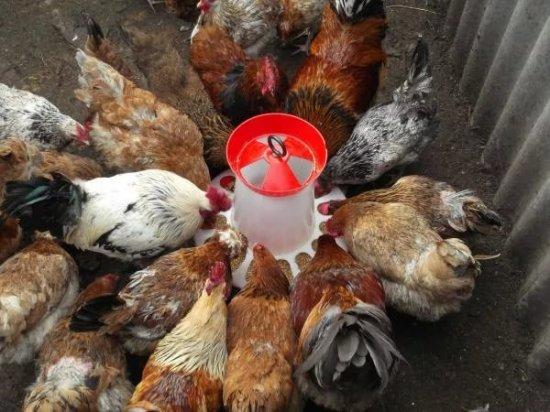
How to calculate portions based on chicken weight
The proportions of the feed ingredients are determined by the weight of the bird. The birds need 125 grams of feed. This amount is enough for a bird weighing 1.5 kilograms, which lays a maximum of 100 eggs per year.
As the weight of the bird increases, it is recommended to increase the portion by 15 grams per 250 grams of mass. It is recommended to round off parameters.
The amount of food depends on the performance of the layer. If it exceeds 100 eggs per year, the feed dosage is increased by 100 grams for every next 30 eggs.
What to feed the hens
A complete diet always contains valuable substances. Birds require an optimal amount of protein, fat and carbohydrates.
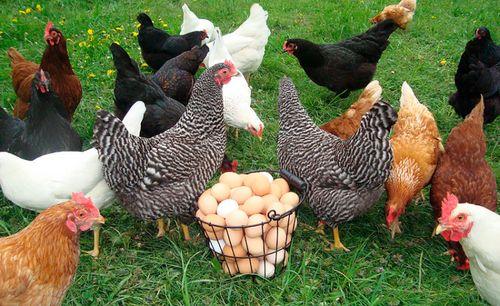
Mineral feed
Chicken needs a lot of minerals per day. Layers need calcium, sodium, iron. They are in need of chlorine, phosphorus. All of these elements support the strength of the shell.
Mineral feeds include chalk, salt, shells. It is also recommended to give chickens limestone and feed phosphates. All these products must be thoroughly grinded. Mineral components should be combined with grain or put in a wet mixture.
Protein
Protein is considered the foundation of the body. A lot of protein enters the body if chickens eat plant and animal foods. Sources of protein are yeast, cake, meal. Also, this component is present in legumes, nettle flour. You can get animal proteins from cottage cheese, milk. The source of this substance is fish and meat and bone meal. Experts advise against using a lot of fishmeal. It will badly affect the taste of eggs.
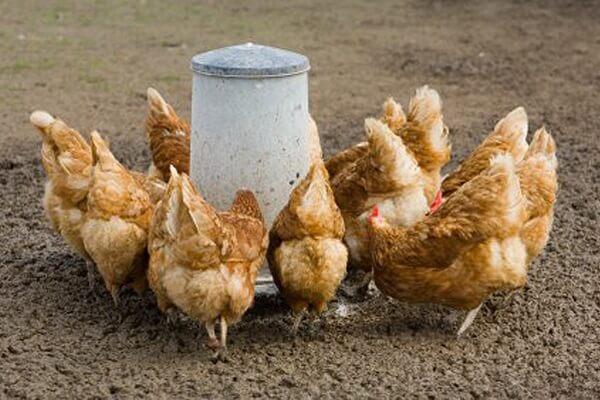
Vitamin
The daily menu of chickens should include vitamins.They strengthen the immune system and protect birds from disease. In summer, fresh herbs are considered a source of vitamins. In winter, chickens receive valuable substances from dry hay. Also, chickens should be given tops, grass flour, chopped carrots.
Rich in carbohydrates
This feed group includes grains and vegetables. Useful grain crops include corn, oats, barley. Chickens also need wheat and millet. Farmers advise germinating some cereals. It helps to increase the amount of vitamin E.
Vegetables
Birds need potatoes from vegetables. They also have a need for root crops. Melons are a real delicacy for birds. To replenish your carbohydrate supply, you should use bran. They are put into ready-made feed.
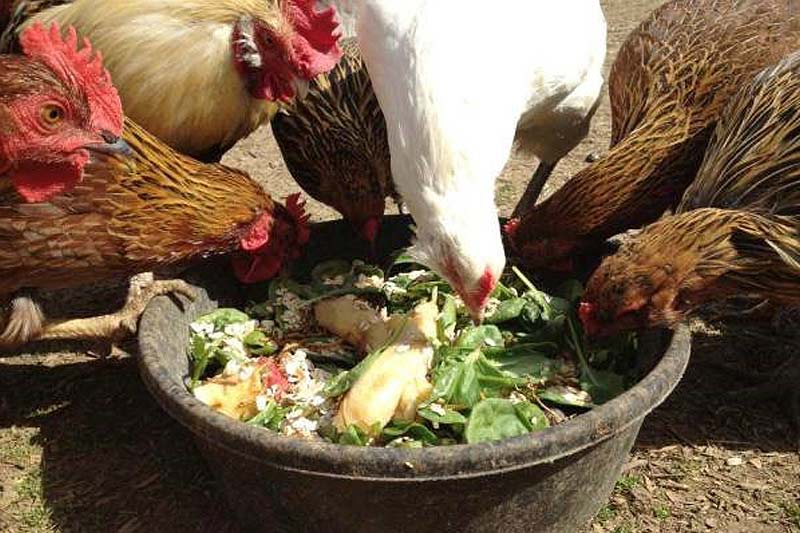
How to feed chickens for better egg production?
In order for the birds to fly well and produce large eggs, they are advised to choose the right diet. This should be done taking into account the seasonal factor. For the winter, birds are advised to harvest nettles. It is also helpful to make pine flour. Harvesting of various root crops is of no small importance. There should be a lot of cabbage on the bird menu.
If the temperature is up to -20 degrees, it is recommended to feed the birds 2 times. At low rates, the number of meals is increased to 3.
In the morning they use soft food. It should be warm. Porridge is perfect. It is also permissible to give a mash. You need to add cottage cheese to it. Also, in the morning, chickens should be given chalk, grass flour, vitamin and mineral complexes. In the morning, the bird should receive boiled vegetables. Chickens are also offered chopped cabbage. Cereals are given to the bird in the evening - before bedtime. The grains may well be stored until morning. To increase productivity, it is recommended to feed chickens with maggots. Earthworms are also good.
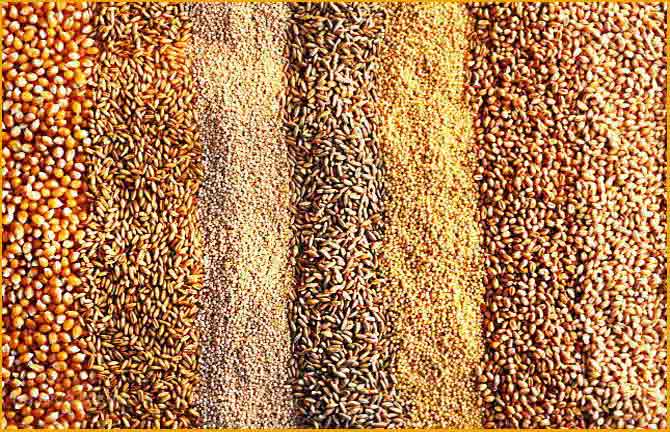
The winter bird menu is presented in the table:
| Product | Quantity, gram |
| wheat bran | 10 |
| boiled potatoes | 100 |
| cottage cheese | 500 |
| grains | 100 |
| serum | 100 |
| boiled root vegetables | 50 |
| dried nettle | 10 |
| wet mash | 50 |
| a piece of chalk | 3 |
| bone flour | 2 |
| sunflower pulp | 7 |
| salt | 0,5 |
Every day, the bird should be given potatoes. This vegetable contains a lot of starch, which provides energy to birds and helps them maintain optimal body temperature.
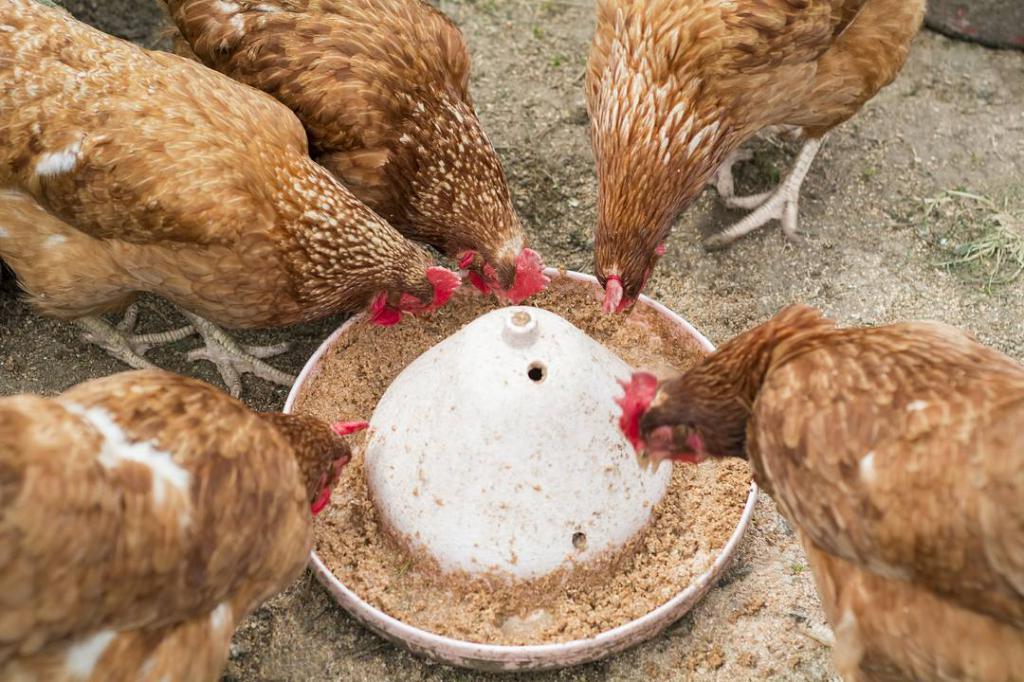
In summer, the bird does not need to spend a lot of energy on heating. Therefore, the calorie content of the diet is significantly reduced. In the summer, the diet includes the following:
- vegetable mash;
- yeast;
- bone flour;
- cereals;
- flour mixture;
- fish fat.
In summer, the bird is able to get some of the nutrients on its own. This is due to the fact that she can be on the street.
What should not be fed to birds?
Chickens are prohibited from giving a number of foods, as they can cause disease. These foods include the following:
- chicken meat;
- sprouted potatoes;
- potato broth;
- orange peel;
- moldy bread;
- quicklime;
- green potatoes;
- spoiled food.
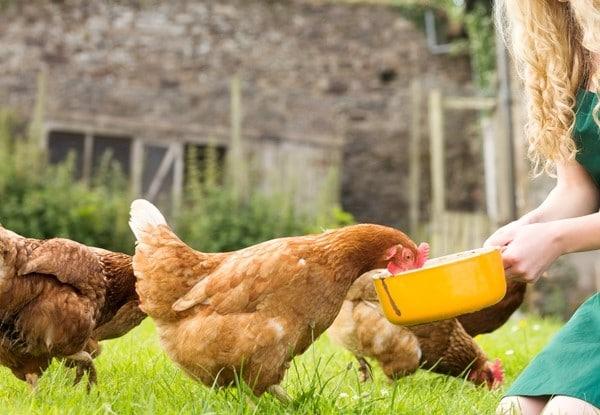
If these recommendations are violated, the likelihood of developing various pathologies in birds is high.
Possible reasons for low productivity
Strict adherence to the recommendations for bird nutrition does not exclude problems, in particular, a drop in productivity. There may be several reasons for this phenomenon:
- Molting. The physiological period of feather loss is accompanied by a large consumption of nutrients. They are required to renew the plumage of birds. That is why the birds have too little strength for laying. During this period, the need for valuable substances in birds increases. Therefore, experts advise to increase the amount of animal food in the bird menu. They should be given a lot of protein foods.
- Incorrect lighting. Shorter days are a common cause of problems.
- Frequent change of nest placement.
- Sharp temperature fluctuations.
- Unbalanced diet.
- Overfeeding.
- Lack or insufficient frequent water changes.
- Diseases.
- Stress factors.
Chicken nutrition is of great importance. For birds to develop normally and be highly productive, their diet must be as balanced as possible.
